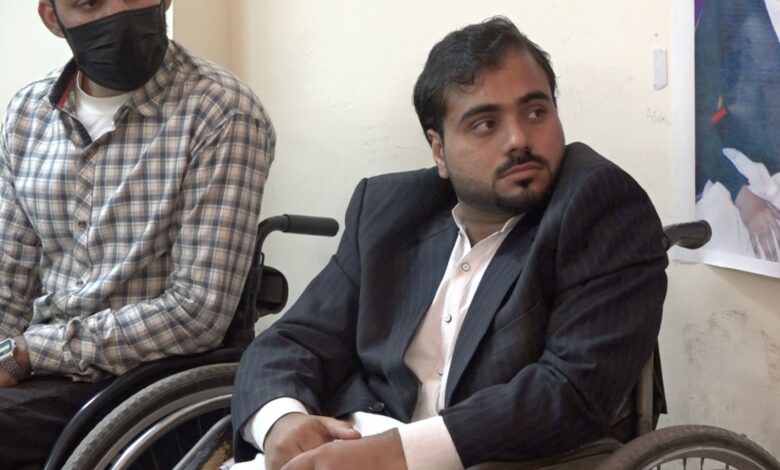
Mushtaq Hussain, Information Secretary of the organization "Friends of Paraplegics" and Caretaker of the Paraplegic Center Peshawar, emphasizes the need for accessible voting facilities for disabled citizens.
Despite being a taxpayer and having the right to vote, he laments the absence of provisions for their access to polling stations, stating, "There should not be elections at all if there is no provision for them."
Having experienced the challenges of living with a disability throughout his 60-year life, particularly during elections, Mushtaq Hussain notes the lack of special provisions such as ramps for wheelchair users in polling stations located within government buildings. Despite promises from political figures during elections, no tangible improvements have been made for disabled individuals.
Expressing frustration, Mushtaq Hussain highlights the disregard for disabled people in official records and the absence of data, asserting, "We are not counted among the country's population for the last 75 years." He warns that without adequate provisions for disabled access in future elections, they may consider boycotting the voting process, leading to a significant loss of votes for political parties.
Referring to the substantial population of disabled individuals, he cites the World Health Organization's 2017 report, stating that 14.2 percent of the country's total population, approximately 28 million people, have various disabilities. In Khyber Pakhtunkhwa alone, around 60,000 to 70,000 people are estimated to be disabled, with data not available even to the social welfare department. Additionally, he mentions that over the last 40 years, 12,000 people have suffered from spinal cord injuries.
Also Read: Terrorist Attack on a Police Station Claims Lives of 10 Officers in D.I. Khan
Mushtaq Hussain emphasizes the necessity of having a representative for the disabled in the assembly to advocate for their concerns openly in both provincial and national assemblies. He points out key issues faced by disabled individuals, including the need for a simplified process to obtain a disabled identity card, prevention of fake ID cards, and increased job opportunities based on education and numbers.
Zahid Abdullah, from the Center for Peace and Development Initiative (CPDI), disagrees with Mushtaq Hussain's stance on reserved seats, suggesting that disabled individuals should actively participate in politics, join a party, work hard, and contest elections to reach the assembly. Abdullah highlights the ongoing survey on the accessibility of government buildings for disabled people, emphasizing the difficulty faced nationwide. He stresses the importance of conforming to prescribed standards in constructing ramps for safe access.
While acknowledging that there are no legal barriers for disabled people to vote in Pakistan, Zahid Abdullah mentions that social attitudes pose challenges, with some questioning the necessity for disabled individuals to vote. He emphasizes the need to correct societal perceptions about voting for disabled persons.
Despite efforts to obtain data on persons with disabilities in Khyber Pakhtunkhwa through the Access to Information Act, no response has been received from the Department of Population Welfare. However, data from NADRA's website indicates a total of 116,425 disabled persons in Khyber Pakhtunkhwa, with 101,625 possessing ID cards and 2,624 being children.
According to the World Health Organization's 2021 report, 15% of Pakistan's population comprises disabled individuals, with 8% being visually impaired, 7% deaf and mute, 8% mentally ill, and 6% facing other forms of disability. The report estimates 913,667 disabled people in Pakistan, including 227,331 in Khyber Pakhtunkhwa.
When questioned about accommodating disabled voters in elections, Chief Election Commissioner of Khyber Pakhtunkhwa, Shamshad Khan, stated that the Election Commission is actively working to engage citizens from all walks of life. Clear instructions mandate ground-floor polling booths and ramp facilities at all polling stations, ensuring wheelchair users can easily access voting booths.
However, the spokesperson for Election Khyber Pakhtunkhwa, Sohail Ahmed, lacks specific data on ramps or inaccessible polling stations. He mentioned general instructions for accessibility but acknowledged the absence of detailed statistics. Regarding the postal ballot paper, Sohail Ahmed deferred to the Election Commission Secretariat Islamabad and District Returning Officers for data, emphasizing that it is integrated into overall vote counts.
Sohail Ahmed highlighted the Election Commission's general budget covering activities like training, awareness programs, and voter education. While no specific budget is allocated for certain segments, he emphasized the importance of promoting awareness about the postal ballot for disabled individuals, ensuring they know about the facility and can avail it if they prefer voting at home.
To enhance awareness, Sohail Ahmed mentioned a wing of the Election Commission dedicated to voter education. He stressed the responsibility of all to spread information about the postal ballot for disabled individuals and emphasized the inclusion of disabled persons in voter education committees at district and provincial levels, ensuring their suggestions are valued and implemented.
In the context of elections for national and provincial assemblies, accessibility for disabled citizens during rallies and voting processes has drawn varied responses from political leaders. Shaukat Yousafzai, a prominent figure in Pakistan Tehreek-e-Insaf, highlighted the challenge of accessibility for disabled individuals and proposed solutions. He suggested providing free transport for voters to polling stations, mirroring practices in other countries. Additionally, Yousafzai recommended creating dedicated polling booths for disabled individuals at each polling station, ensuring their active and convenient participation in the electoral process.
Samar Haroon Bilor, the Provincial Spokesperson of Awami National Party, expressed the party's commitment to supporting vulnerable individuals, emphasizing the importance of reaching every citizen during elections. She mentioned the party's past efforts in addressing concerns of disabled people in the assembly, particularly regarding job quotas. Bilor affirmed continued advocacy for the rights of disabled individuals.
Sobia Shahid, President of Muslim League (N) Khyber Pakhtunkhwa Women's Wing, underscored the party's dedication to encouraging every citizen, including disabled individuals, to participate in the electoral process. She pledged to make special arrangements, including providing transport facilities and assistance to access polling booths for disabled voters.
Shahid also called for increased efforts by the Election Commission to facilitate disabled individuals, urging the creation of separate booths and government-backed transport initiatives for their convenience.